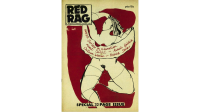
Overview
New information technologies often provoke hopes and fears in their time of early establishment. Before digital search engines, alphabetical order was the standard method for enabling easy information retrieval. However, 350 years ago, this method was perceived as something new, with unknown consequences for the users’ learning.
In the book project “The Dictionary Craze in Enlightenment Europe”, Linn Holmberg explores the cultural reception and impact of the dictionary genre’s big break in the long eighteenth century. During this period, the explosive proliferation of alphabetically-organized reference-works inspired contemporaries to speak of a “dictionary mania” or “dictionary craze”. Some viewed the phenomenon as a sign of enlightenment spreading in society, while others saw a threat to the very foundations of learning.
By analysing accounts about dictionaries in some twenty European journals between 1665 and 1800, the book tracks the dictionary genre’s rise to popularity, and charts out the debates, fears, and hopes that it raised about knowledge and learning. The book also highlights the role of the periodical press in defining what a dictionary was, stimulating dictionary production, and voicing contrasting opinions about its cultural impact, all of which tapped deep into the intellectual and social conflicts of the Enlightenment movement.
Speaker
Dr Linn Holmberg, Associate Professor in History of Ideas at Stockholm University, earned her PhD in History of Science and Ideas from Umeå University in 2014. After completing postdoctoral projects at Uppsala University and Stockholm University, she joined the Pro Futura Scientia Programme in 2019. Holmberg's research encompasses the history of encyclopaedism, information management, and debates about knowledge and learning in early modern Europe. She has previously devoted great attention to unfinished encyclopaedic projects in eighteenth-century France and Sweden. Her current book project, "The Dictionary Craze," delves into the transnational reception and cultural impact of the dictionary genre during its rise to prominence between 1665 and 1800, and its complicated relationship to the Enlightenment movement.
Details
This is a hybrid event, which will take place in-person in the Gatsby Room (Chancellor's Centre) and also on Zoom.
If you would like to attend online, please register for the Zoom link.
Refreshments will be available for the in-person audience.
The Humanities Society organises regular talks spanning a wide range of topics. Every Tuesday during term time.
Access
This event will take place in Gatsby Room on the first floor of the Chancellor's Centre. It has step-free access with a lift and there is an accessible toilet located each floor of the building.
For more details please view our AccessAble guide.
AI-generated image.

